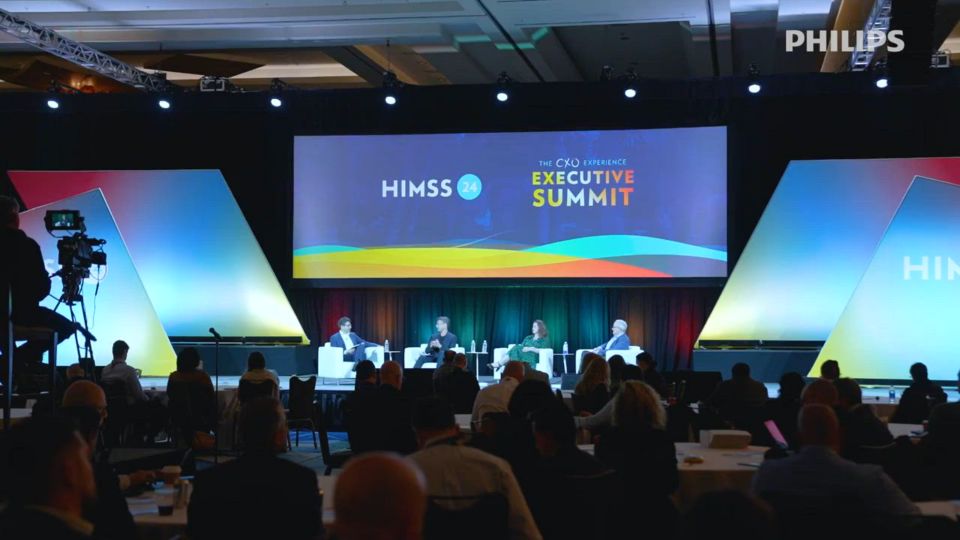Philips panel discussion at HIMSS24 focuses on the role of predictive and generative AI in addressing critical healthcare challenges
Mar 21, 2024 | 3 minute read
Artificial intelligence (AI) that helps clinicians diagnose and treat patients more effectively and healthcare providers operate more efficiently, and generative AI that relieves clinicians of time-consuming administrative tasks, are widely recognized as key to solving the imbalance between increased patient demand and today’s shortage of clinical professionals. At the 2024 Healthcare Information and Management Systems Society Global Health Conference & Exhibition (HIMSS24, March 11-15, 2024, Orlando, USA) Philips Chief Innovation & Strategy Officer, Shez Partovi, sat down with a panel of healthcare industry AI experts – Dr Claire Bloomfield, Senior Director International Corporate Strategy & Development at Insitro, Gary Fritz, Chief of Applications at Stanford Health Care, and Dr Rowland Illing, Head of Global Health and Chief Medical Officer at AWS – to discuss the strategies and pre-requisites for ethical and effective development, adoption, deployment, and future of AI in healthcare.

On developing a strategy
When it comes to preparing large healthcare organizations for the impact of AI, Claire Bloomfield has a wealth of experience working alongside the UK National Health Service (NHS). Her main message: educate and get everyone in the organization involved in understanding what AI is and what it is capable of achieving right from the beginning.
Bloomfield: “You need your procurement teams, your contractual and commercial teams, and your IT people all in the room at the same time . . . multidisciplinary team that can think about adoption of these types of innovation, because you need those different perspectives. If you don't know the questions to ask, you're presenting yourself with risks further down the line.”
On where to start
Although clinical applications may be the most exciting, AI applications that address operational issues may offer the best learning curve.
Bloomfield: “Does it feel safer to start in a space where you're not directly touching and impacting patient care? That’s probably not a bad place to start thinking about some of the fundamentals around information governance and data infrastructures. Then later on you can roll out and expand into some of the more innovative spaces,” commented Bloomfield.
To illustrate that difference between those two spaces, Shez Partovi compared Philips’ use of AI to instantly detect whether a pathology slide scan is out-of-focus so that it can be immediately rescanned – an operational application that saves valuable time and money – against the company’s patient monitoring solutions that monitor a patient's heart rhythm for 24 hours and predict if they will experience ventricular tachycardia or atrial fibrillation in the next two weeks – a clinical application that directly affects patient care.
On data infrastructures
AI’s dependence on large amounts of data, both during its training and use, is why cloud-based service providers (so-called hyperscalers), represented on the panel by AWS’s Rowland Illing, have become key enablers of AI deployment.
Illing: “AWS’s role is to enable access to and the delivery of person-centered care . . . by accelerating the digitization and utilization of healthcare data. What we are doing is building specific services, managed packets of code, which can handle specific data types and provide specific functionality for applications which the likes of Philips can build on to build out the next generation of cloud-native solutions.”

Watch highlights of the Philips panel discussion on AI and generative AI at HIMSS24
On data quality
For Gary Fritz, who is currently rolling out advanced AI and generative AI solutions in clinical environments, it’s not only the existence of these hyperscalers that’s important. It’s also about the quality of the data stored in them and the purpose to which it is put.
Fritz: “To create new models, it's very important that you have a controlled environment, a protected environment with hyperscalers. But the data also needs to be of quality, free from bias as much as you can make it, and in a condition that it can be ethically and responsibly used.”
On governance & deployment
The panel also pointed out that curating and normalizing data for use in AI applications is not an easy task. And good governance, in terms of privacy, security, and ethical use remains a top priority.
Embedding an application into a clinical workflow is not the end of the story. When it comes to successful deployment, what everyone agreed on was that a major key to success is educating the entire organization about the technology and its benefits, from the C-Suite down. It’s not only about getting people’s buy-in. It’s also critical to clinician-patient interaction on the use of AI.
Watch the video








